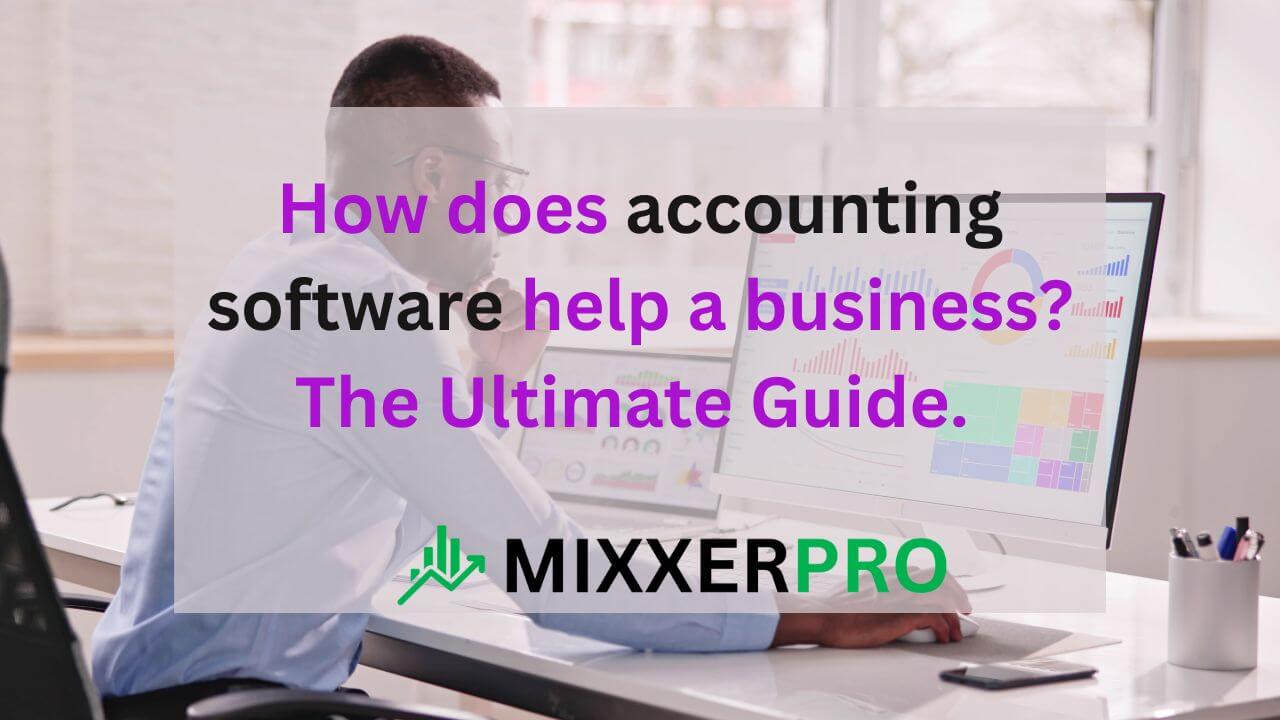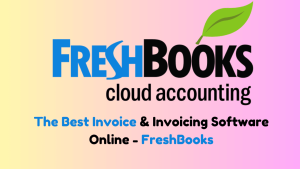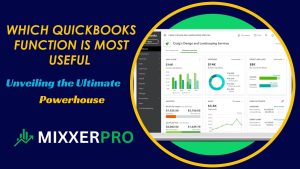How does accounting software help a business? The Ultimate Guide.
Are you looking for ways to streamline your budgeting and financial processes? Learn how accounting software can help your business stay organized and efficient. Discover the benefits today.
Table of Contents
The Importance of Accounting Software for Businesses
Businesses of all sizes can benefit from using accounting software. It allows for streamlined financial management, accurate budgeting and forecasting, and easy tax compliance. In today’s digital age, utilizing accounting software has become necessary for businesses looking to stay competitive and organized. In this article, we will explore how accounting software helps businesses and the diverse facets of its role in overall business success.
Efficiency and Time Savings
One of the main benefits of using accounting software for businesses is its efficiency. Traditional manual bookkeeping methods require much time and effort to maintain accurate records and financial statements. However, using accounting software, companies can automate many tasks and processes, saving time and reducing the risk of errors.
Additionally, most accounting software has data entry automation, bank reconciliation, and automatic invoice generation features. These features eliminate the need for manual data entry, saving businesses work hours each week. It also allows for real-time data updates, making it easier for businesses to make informed decisions based on their financial situation.
Budgeting and Forecasting
Accurate budgeting and forecasting are crucial for the success of any business. Accounting software allows businesses to create detailed budgets and financial forecasts based on past performance and current trends. This allows for better financial planning and helps companies to stay on track with their goals.
Moreover, most accounting software also can generate various reports and financial statements, such as profit and loss statements and balance sheets. These reports give businesses an in-depth understanding of their financial standing, allowing them to make necessary adjustments and better allocate resources for future growth.
Tax Compliance and Avoidance of Costly Errors
Proper tax compliance is essential for all businesses, regardless of size. With accounting software, companies can easily keep track of their financial records and ensure accurate tax reporting. Many software programs have tax preparation tools that help businesses comply with the latest tax laws and regulations. This saves time, ensures accuracy, and minimizes the risk of costly errors.
Furthermore, the ability to track expenses and income in real-time through accounting software helps businesses avoid costly errors such as over or under-reporting financial data. These errors can result in hefty fines and penalties, making using accounting software crucial for avoiding these costly mistakes.
Remote Access and Data Security
In today’s fast-paced world, many businesses have adopted remote work options for their employees. This has highlighted the importance of remote access to business data and the need for secure storage of confidential information. Accounting software allows for remote access to financial data, making it easier for businesses to stay connected and manage their finances from anywhere.
Moreover, most accounting software comes with secure cloud storage options, providing businesses with peace of mind regarding data security. All financial data is stored on secure servers, reducing the risk of data loss or theft. This aspect of accounting software is especially essential for businesses that handle sensitive customer information and must comply with data protection laws.
Integration with Other Business Tools
Another significant advantage of using accounting software is its ability to integrate with other business tools. For instance, most software can integrate with point-of-sale systems, customer relationship management software, and project management tools. This allows all business data to be easily synchronized, eliminating the need for manual data entry and reducing the risk of errors.
Integration with other tools also gives a more comprehensive overview of the business’s financial health. For example, by integrating with project management software, companies can see how each project performs financially and adjust accordingly.
Customization and Scalability
Not all businesses are the same; therefore, their accounting needs may differ. Most accounting software provides firms with customizable options, allowing them to tailor the software to their needs. This level of customization is especially beneficial for businesses with complex financial structures or unique reporting requirements.
Furthermore, accounting software is also scalable, meaning it can grow with the business. As a business expands, its financial management needs will become more complex. Accounting software can handle this growth, allowing companies to continue using the same software without the need for frequent updates or changes.
Access to Real-Time Financial Data
One of the critical features of accounting software is its ability to provide real-time financial data. This allows businesses to have an up-to-date view of their finances without waiting for manual reports or calculations. It also eliminates the need for companies to have separate systems for tracking financial data, making it easier to stay organized and efficient.
Moreover, real-time data also allows businesses to make data-driven decisions quickly. Whether it’s a financial investment or a budget adjustment, having access to real-time data helps companies make informed and timely decisions that can impact their bottom line positively.
Accuracy and Audit Trail
Accuracy is crucial in financial management, and accounting software helps businesses achieve this. With features such as automatic data entry, bank reconciliation, and data validation, companies can trust that their financial records are accurate and reliable. This is especially important for businesses that must provide financial records for audits or tax purposes.
Additionally, most accounting software maintains an audit trail, which tracks all the changes made to financial records. This ensures accuracy and provides businesses with a detailed history of any changes made, providing transparency and accountability.
In How does accounting software help a business? The Ultimate Guide

How Accounting Software Impacts a Business
While the traditional method of manually recording and tracking financial transactions has been the norm for centuries, technological advancements have significantly transformed the accounting industry. With the introduction of accounting software, businesses of all sizes have been able to streamline their financial processes and improve their overall operations. In this guide, we will delve into the various ways in which accounting software helps a business.
Impact on Industries
The impact of accounting software on different industries cannot be overstated. The traditional method of manual bookkeeping is not only time-consuming but also prone to error. This can be particularly problematic for industries that handle a high volume of financial transactions. For example, accounting software can significantly reduce the risk of human error in retail, where there are numerous daily sales and purchases. This, in turn, can save the business both time and money.
Moreover, the advent of cloud-based accounting software has made it easier for businesses to access their financial data anywhere, anytime. This has particularly benefited service-oriented industries, such as consulting firms and freelancers, who often work remotely. With cloud-based accounting software, they can easily track their expenses and revenues and generate invoices from any location, making their work more efficient and streamlined.
Technological Innovations
The continuous development and innovation in accounting software have greatly enhanced its capabilities and made it an indispensable tool for businesses. Accounting software has evolved significantly from basic bookkeeping and invoicing to advanced features like budgeting and forecasting. It is now a tool for record-keeping but has become a comprehensive financial management solution for businesses.
One of the key technological innovations in accounting software is the integration of artificial intelligence (AI) and machine learning. These advancements have enabled software to automate tedious financial tasks, such as data entry and reconciliation. With AI, the software can also detect patterns and predict future economic trends, providing businesses with valuable insights to make informed decisions.
User Experience
Accounting software has not only transformed the way businesses handle their finances but has also greatly improved the user experience. With intuitive interfaces and user-friendly features, modern accounting software is accessible to users of all skill levels. This has dramatically reduced the learning curve for new users, making it easier for businesses to adopt and implement the software.
Moreover, with the availability of mobile accounting apps, users can now access their financial data on the go and manage their business finances from their smartphones or tablets. This has dramatically enhanced the convenience and flexibility of accounting software, making it a valuable asset for businesses.
How does accounting software help a business? The Ultimate Guide
The Importance of Accounting Software for Small Businesses
Accounting is an essential aspect of managing a business, regardless of its size. Accurate and organized financial records are crucial for making informed decisions, operating expenses, and meeting legal requirements. However, manual bookkeeping processes can be time-consuming and prone to human error. This is where accounting software comes in. With the advancement of technology, businesses now have access to powerful accounting software that can streamline their financial operations and enhance productivity. This blog post will explore how accounting software helps businesses, their challenges, success stories, and emerging trends.
The Challenges Businesses Face Without Accounting Software
Before accounting software became readily available, businesses used manual bookkeeping methods, which were inefficient and prone to errors. These methods involved using paper ledgers and spreadsheets to track income, expenses, and other financial transactions. It not only required a significant amount of time and effort but also made it challenging to stay organized and keep track of cash flow. Moreover, manual bookkeeping often results in errors that could lead to financial discrepancies, loss of income, and potential legal consequences.
Another significant challenge businesses face without accounting software is the inability to generate timely financial reports. This can hinder decision-making and make it difficult for companies to identify potential problems before they escalate. Moreover, with efficient accounting software, businesses may be able to keep up with changing tax laws and regulations, increasing the risk of legal penalties.
The Success of Businesses Using Accounting Software
Accounting software has proven to be a game-changer for small businesses with limited resources. By automating accounting processes, companies can save time, minimize errors, and maintain accurate financial records. This increases efficiency and reduces the risk of financial discrepancies and legal consequences. Additionally, accounting software allows businesses to generate timely financial reports, providing valuable insights into their financial performance and aiding decision-making.
One success story of a business using accounting software is that of a small retail store. Before implementing accounting software, the store needed help manually tracking and reconciling sales and inventory. However, after switching to an accounting software solution, the store was able to track sales and inventory in real-time, making it easier to manage stock and identify trends. This led to an increase in sales and profitability for the store.
Accounting software has also played a crucial role in the success of remote work. With the onset of the COVID-19 pandemic, many businesses were forced to switch to remote work to ensure the safety of their employees. This was made possible through cloud-based accounting software, which allowed companies to access financial data from anywhere, anytime.
Emerging Trends in Accounting Software
As technology continues to evolve, accounting software also grows to meet the changing needs of businesses. Here are some emerging trends in accounting software that companies should be aware of:
- Cloud-Based Solutions
Cloud-based accounting software has become increasingly popular in recent years, allowing businesses to access their financial data from anywhere, anytime. This eliminates the need for companies to invest in expensive on-premise servers and IT infrastructure, making it a more cost-effective solution.
- Artificial Intelligence (AI)
AI technology is being incorporated into accounting software, making it more efficient and accurate. AI-powered accounting software can analyze large amounts of data, identify patterns, and provide valuable insights to help businesses make more informed decisions.
- Automation
Automation is a game-changer for businesses, as it eliminates the need for manual data entry and repetitive tasks. With automation, companies can save time and reduce the risk of human error, allowing them to focus on more critical tasks.
- Integration with Other Systems
Many accounting software solutions now integrate with other systems, such as CRM and inventory management software. This allows for seamless data transfer and provides a holistic view of the business’s operations.
How does accounting software help a business? The Ultimate Guide
How Accounting Software Can Revolutionize Your Business
Running a business requires keeping accurate records and managing finances effectively. In the past, manual bookkeeping was the primary method for tracking financial information, but technological advancements have increased the use of accounting software. This technical solution has transformed how businesses manage their financials, providing numerous benefits and opportunities for growth.
In this article, we will explore how accounting software can help a business, from recent developments and case studies to expert opinions. So, if you’re a business owner looking to streamline your financial management processes, keep reading to find out how accounting software can bring significant improvements to your business.
Recent Developments in Accounting Software
Over the years, accounting software has significantly evolved and advanced in features, functionality, and ease of use. Modern accounting software is now cloud-based, meaning it can be accessed from anywhere, anytime, as long as an internet connection exists. This has eliminated the need for businesses to install and maintain software on their computers, reducing costs and increasing convenience.
Additionally, accounting software now comes equipped with artificial intelligence and machine learning capabilities, enabling it to automate tedious and time-consuming tasks such as data entry and bank reconciliation. This saves time and reduces the risk of human error, improving the accuracy and reliability of financial records.
Case Studies: Real-Life Success Stories
Numerous businesses have already experienced the benefits of using accounting software. Let’s look at two case studies to see how they have impacted these businesses positively.
Case Study 1: ABC Retail Store
ABC Retail Store is a small retail business that sells clothing and accessories. Before using accounting software, they were manually tracking their inventory and sales, which were becoming increasingly challenging as their business grew. They also needed help to track their cash flow and financial records, leading to errors and discrepancies.
After implementing accounting software, ABC Retail Store was able to automate its inventory management and sales tracking processes. They could now keep track of their inventory levels in real time and identify which products were selling well. The software also provided them with comprehensive financial reports, giving them insights into their cash flow and profitability. This helped them make better-informed business decisions, increasing profits and improving efficiency.
Case Study 2: XYZ Consulting Firm
XYZ Consulting Firm is a medium-sized business that offers consulting services to various clients. They needed help tracking project expenses and invoicing clients, leading to payment delays and inaccurate financial records.
After implementing accounting software, XYZ Consulting Firm significantly improved its financial management processes. The software allowed them to track project expenses and generate accurate invoices, making getting paid on time easier. They also had access to real-time financial data, giving them a clear overview of their business’s financial health. As a result, they were able to improve their cash flow and make more informed decisions about their projects and investments.
Expert Opinions on Accounting Software
To better understand how accounting software can help a business, we spoke to accounting experts for their opinions and insights. Here’s what they had to say:
Accounting software has made it possible for businesses of all sizes to manage their finances more efficiently. Its advanced features such as automation and real-time data can save businesses a significant amount of time and effort, allowing them to focus on other important aspects of their operations.” – John Smith, Certified Public Accountant.
Cloud-based accounting software has been a game-changer for businesses, especially those with multiple locations or remote employees. It has eliminated the need for physical records and has made it easier for businesses to collaborate and share financial data with their accountants and advisors.” – Sarah Jones, Financial Advisor.
“Artificial intelligence and machine learning have made accounting software smarter and more accurate. It can now identify patterns and trends in financial data, providing businesses with valuable insights and helping them make data-driven decisions.” – Michael Brown, Accounting Software Developer.
How does accounting software help a business? The Ultimate Guide
Overview of Accounting Software
Accounting software is a powerful tool that helps businesses manage financial transactions and records. It is a digital solution that automates the complex processes of bookkeeping and accounting, making it easier and more efficient for companies to track their finances. With the evolution of digital technology, accounting software has become an essential tool for businesses of all sizes, providing numerous benefits and opportunities for growth. In this article, we will explore in detail how accounting software helps a business.
Practical Applications of Accounting Software
Accounting software has a wide range of practical applications that can benefit businesses. Let’s take a closer look at some of the critical practical applications of accounting software.
- Automating Bookkeeping: Bookkeeping is a tedious and time-consuming task that involves recording, classifying, and organizing financial data. Accounting software automates this process, eliminating the need for manual data entry and reducing the chances of errors. This saves time and ensures the accuracy and reliability of financial records.
- Generating Financial Reports: Accounting software can generate real-time financial reports, including balance sheets, income statements, and cash flow statements. This provides businesses with a clear and accurate view of their financial health and helps them make informed decisions based on data.
- Managing Invoicing and Billing: Accounting software allows businesses to manage their invoicing and billing processes efficiently. It can generate customized invoices, track payments, and send automated reminders to clients for pending payments. This helps businesses maintain a steady cash flow and improves their financial management.
- Tracking Expenses and Budgeting: Accounting software allows businesses to track their expenses and create budgets based on historical data. This enables enterprises to identify areas of overspending and make necessary adjustments to improve their financial performance.
- Cash Flow Management: Accounting software allows businesses to track their cash flow in real-time. This helps companies to maintain a healthy cash flow, avoid financial crises, and plan for future investments and expenses.
- Streamlining Tax Compliance: Handling tax compliance can be daunting for businesses. With accounting software, companies can automate tax calculations, generate tax reports, and ensure compliance with tax laws. This eliminates the risk of errors and saves businesses from penalties and fines.
Challenges of Implementing Accounting Software
While accounting software offers numerous benefits, businesses may face a few challenges when implementing it. Let’s look at some common challenges companies face when adopting accounting software.
- Cost: The upfront cost of purchasing accounting software can be a barrier for some businesses, such as tiny and medium-sized enterprises. There may also be ongoing subscription fees or additional costs for advanced features, which may not be feasible for some businesses.
- Training and Learning Curve: Implementing accounting software requires employees to be trained on how to use it effectively. This can be time-consuming and may require businesses to allocate resources for training. Additionally, some employees may need help to adapt to a new system, resulting in a learning curve that can affect productivity.
- Data Security: With the increasing threat of cyberattacks, data security is a significant concern for businesses implementing accounting software. Any breach in data security can result in sensitive financial information being compromised, putting the company at risk.
- Lack of Flexibility: Accounting software may only sometimes be flexible enough to accommodate the unique needs of a business. Some companies may have complex financial processes that cannot be automated by standard accounting software, requiring them to invest in customized solutions.
- Integration Issues: Implementing accounting software may require integration with other systems and software used by a business. This can be a challenge if the accounting software is incompatible with existing systems or the integration process could be more seamless.
The Future Possibilities of Accounting Software
As technology evolves, accounting software also advances, providing businesses with even more possibilities for growth and efficiency. Let’s explore some of the future options of accounting software.
- Artificial Intelligence and Machine Learning: By incorporating artificial intelligence and machine learning, accounting software can automate more complex tasks, such as data analysis, fraud detection, and predictive analytics. This will improve the accuracy and speed of financial processes, allowing businesses to make better-informed decisions.
- Cloud-Based Solutions: Cloud-based accounting software is gaining popularity among businesses due to its accessibility and flexibility. In the future, more accounting software providers will likely offer cloud-based solutions, enabling companies to access their financial data from any device and location.
- Integration with Third-Party Solutions: As businesses use multiple software and systems for different functions, integrating accounting software with third-party solutions will become crucial. This will make it easier for businesses to manage their finances and streamline operations.
- Mobile Applications: Mobile applications are becoming an essential aspect of business operations. Incorporating accounting software on mobile platforms can give businesses real-time access to their financial data. This will allow business owners and employees to manage their finances on the go, improving efficiency and productivity.
- Easier Collaboration: With the rise of remote work and virtual teams, collaboration is becoming increasingly important for businesses. In the future, accounting software will likely offer features that allow teams to work together on financial tasks, improving communication and efficiency.

In Conclusion
In conclusion, accounting software is crucial in helping businesses manage their financial processes. It offers numerous practical applications such as automating bookkeeping, generating financial reports, and operating cash flow. While implementing accounting software may have its challenges, it also provides businesses with future possibilities for growth, such as AI integration, cloud-based solutions, and mobile applications. With the continuous evolution of technology, accounting software will continue to improve and provide businesses with the necessary tools for financial management and success.”How does accounting software help a business? The Ultimate Guide: Learn how accounting works. “How does accounting software help a business? The Ultimate Guide: Are you looking for ways to streamline your budgeting and financial processes? Learn how accounting software can help your business stay organized and efficient. Discover the benefits today. Accounting “How does accounting software help a business? The Ultimate Guide
“How does accounting software help a business? The Ultimate Guide
- How does accounting software help a business?
Accounting software helps businesses by automating many financial tasks, such as tracking expenses, creating invoices, and managing payroll. It also provides real-time insights into a company’s financial health, making it easier to make informed decisions.
- What are the benefits of using accounting software for a business?
Some key benefits of using accounting software for a business include improved accuracy and efficiency in financial tasks, more accessible record-keeping, and better financial reporting. It can also save time and reduce human error.
- How can accounting software help with tax preparation?
With accounting software, businesses can easily track and record all financial transactions, making filing taxes more accessible and ensuring compliance. Many accounting software also offer tax preparation features and can generate tax reports and forms.
- Does accounting software help with budgeting?
Yes, accounting software can be a valuable tool for budgeting. It can track expenses and revenues, forecast future cash flows, and create budget reports. This can help businesses to better manage their finances and make more informed budgeting decisions.
- Can accounting software help with inventory management?
Many accounting software offers inventory management features such as tracking quantities, creating purchase orders, and generating inventory reports. This can help businesses to better manage their inventory and make more accurate financial decisions.
- How does accounting software save businesses money?
Accounting software can save businesses time, reduce human error, and improve efficiency by automating financial tasks and providing real-time insights. This can ultimately lead to cost savings and help businesses make better financial decisions.
- Is accounting software suitable for all types of businesses?
Yes, accounting software can be helpful for businesses of all sizes and industries. Many accounting software are customizable and can be tailored to fit the specific needs of a business. Some software is also designed for industries like retail or manufacturing.
- How secure is accounting software?
Most accounting software offers multiple layers of security, such as data encryption, user authentication, and regular backups. It is essential to choose a reputable and secure software provider and to regularly update the software to ensure the latest security measures are in place.
- Can accounting software help with project management?
Some accounting software offers project management features, allowing businesses to track project expenses, create project budgets, and generate reports. This can help companies to better manage their projects and make more informed decisions.
- Is training required to use accounting software?
While some accounting software can be complex and require training, many are designed to be user-friendly and intuitive. Basic accounting knowledge can be helpful, but most software comes with tutorials and customer support to assist with any questions or issues. “How does accounting software help a business? The Ultimate Guide




